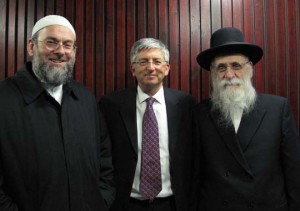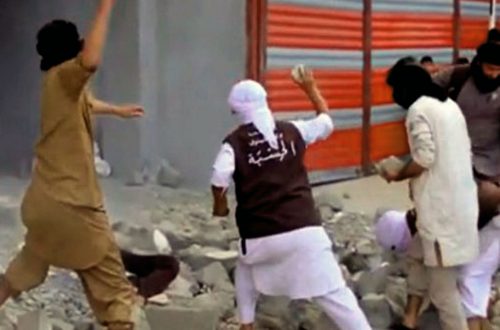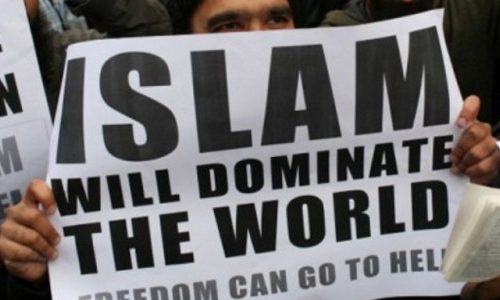On October 18 the Stoke Hospital Mosque will hold a fundraising event for Gaza at King’s Hall, Stoke-on-Trent.
It is not clear who the beneficiary will be. One can guess from the speaker list that it may be Viva Palestina, George Galloway’s Hamas support operation, or Interpal, a charity that is closely linked to Hamas. The scheduled speakers include George Galloway, Ibrahim Hewitt, the chairman of Interpal, and Mohamed Ali Harrath, the CEO of Islam Channel.
Here is Galloway handing cash to Hamas earlier this year in the first Gaza convoy escapade. He had Interpal employees for company on the convoy, including one who was a member of Hamas when he lived in Gaza.
Here is Ibrahim Hewitt on terrorism, as presented in his “What Does Islam Say?” pamphlet, which you can read (pdf) here on HP. He believes the word can be applied widely, including to the UK’s operations in Afghanistan and Iraq. Tagging Palestinians as terrorists is, of course, a very different matter:
International law accepts that people living under illegal military occupation are entitled to fight against the occupiers with whatever means they have at their disposal. If the world does not like, for example, “terrorist suicide bombing” in Palestine (a weapon neither unique to the Palestinians nor invented by them), then, as one Palestinian exile said at a conference in December 2003, “Give us F-16s, Apache helicopters, missiles tanks and heavy weapons, and we’ll have a fair fight”.

Ibrahim Hewitt with Stephen Sizer and Ahron Cohen of Neturei Karta, British Islamists’ favourite Jewish fig leaf
Turning to Mohamed Ali Harrath, he has been convicted in absentia in his native Tunisia of several terrorism offences and sentenced to 56 years in prison. Before fleeing the country, he was a leader of the Tunisian Islamic Front, a radical Islamist group.
Events like this one in Stoke-on-Trent should not be happening. The Charity Commission’s counterterrorism policy is quite clear:
Our key principles when looking at charities with potential links to terrorism are as follows:
– Any links between charities and terrorist activity are totally unacceptable. ‘Links’ in this case might include fundraising or provision of facilities, but also include formal or informal links to organisations ‘proscribed’ under the Terrorism Act 2000, and any subsequent secondary legislation.
– The Charity Commission will deal with any allegation of links between a charity and terrorist activity as an immediate priority.
…
– Where a charity’s activities may give, or appear to give, support or succour to any terrorist activity, the Commission expects the charity’s trustees to take immediate steps to disassociate the charity from the activity.– We expect trustees to be vigilant to ensure that a charity’s premises, assets, volunteers or other goods cannot be used for activities that may, or appear to, support or condone terrorist activities. Examples include the use of a charity’s premises for fundraising or meetings.
– Charities should take all necessary steps to ensure their activities could not be misinterpreted. The Commission expects trustees or charities to ensure their activities are open and transparent, for example when transferring assets abroad. We hold trustees accountable for ensuring that procedures are put in place to ensure that terrorist organisations cannot take advantage of a charity’s status, reputation, facilities or assets.
– We expect any person connected with a charity, whether a trustee, employee, volunteer, advisor or beneficiary, to bring evidence of a charity’s possible links with terrorism to our attention immediately.
In practice, as readers of this blog know, the Commission’s record in counterterrorism is atrocious.
In fact, Ghulam Rasool, the head of the Faith and Social Cohesion unit, formed in 2007, is determined not to help, even though one of the unit’s core missions is the improvement of governance in religious charities.
He is also adamant that the faith unit will not be linked to the terrorism unit. “Our policy is that both worlds are kept separate because, once they become linked, they pollute our vision and corrupt our independence.”
You can see this “active complacency” at work in a report (pdf) from the Faith and Social Cohesion Unit that was published in May this year. In a table listing “risks” facing the unit, arrests of terrorist suspects are presented as a problem, and distancing the Commission from them is the solution:
Risk
High profile media coverage of police raids and arrests in the Muslim Community re-heightens suspicion about government based activity.Likelihood
HighImpact
HighMitigation
To temporarily postpone outreach and workshops until climate and mood of the community is receptive again. Safeguarding outreach officers and minimising the damage to reputation.
Well, this is what one might expect from a man who I understand was the secretary of Islamic Help, a Birmingham-based charity, before joining the Commission. In Iraq, Islamic Help has teamed up with a Baghdad mosque that was at the heart of the Baathist and al Qaeda insurgency. The man the charity hired to manage its Iraqi affairs thinks hostage takers in Iraq “may have a point”, even if their victims did nothing more than provide water to security forces. In Gaza, Islamic Help is aiding Hamas, with cheerleading in the UK provided by George Galloway, Yvonne Ridley and Azzam Tamimi.
In theory, funding Hamas from the UK is a criminal offence.
In reality, yeah, right.


